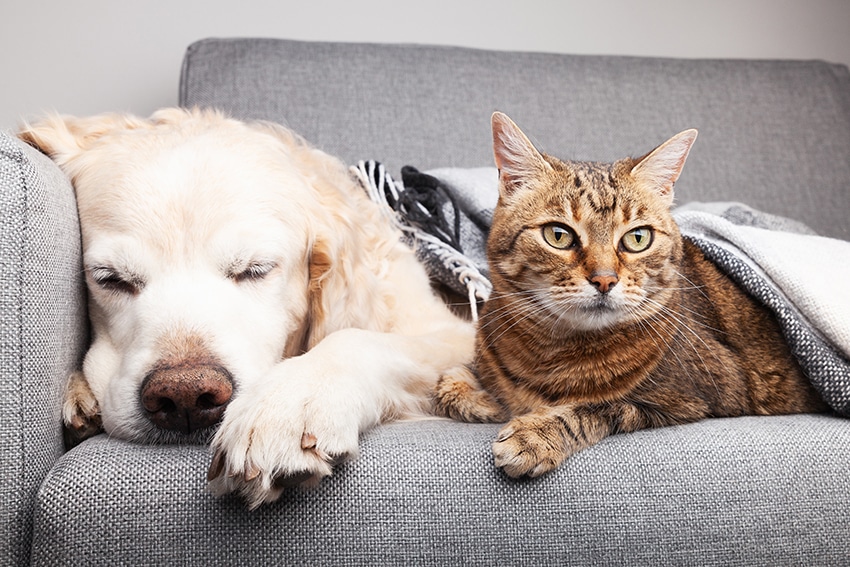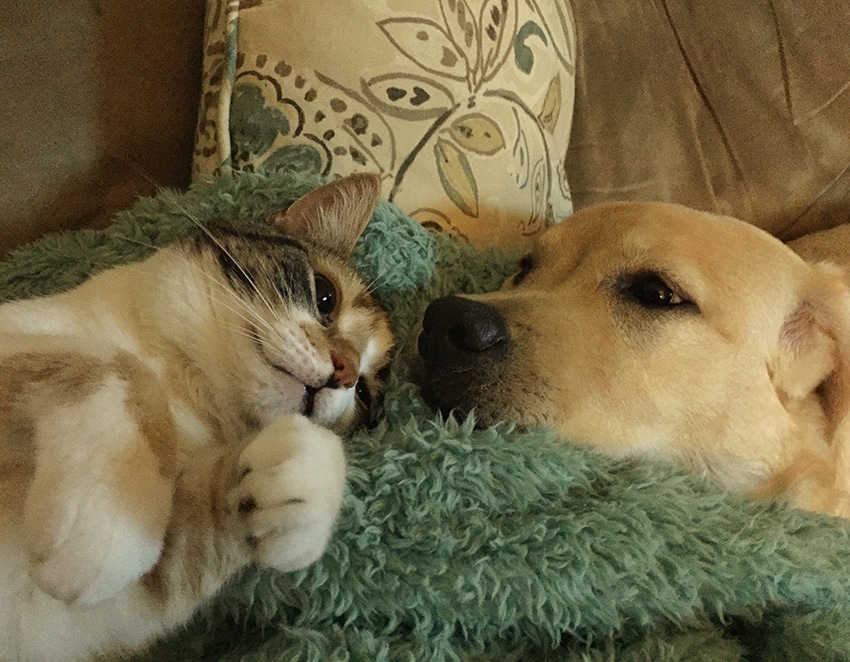Nobody likes fleas. They make your dog miserable and can transmit diseases. What’s more, sometimes they jump on and bite you!
When you find fleas on your furbaby, you want to get rid of them as soon as possible. But what if you discover the pesky pests on Fido and only have cat flea shampoo handy?
Sometimes in practice, I’d get calls from puppy parents asking if they could use flea shampoo on their dog. I would take time to explain that the active ingredients should be safe for dogs, but it wouldn’t be the most effective choice. We’d discuss the ingredients listed on the bottle and what else the owners may need to do to eradicate fleas in their homes.
In this article, we’ll cover why cat flea shampoo is generally safe but not the first choice for dogs. We’ll review the differences between canine and feline flea products and talk about the similarities and differences between cat fleas and dog fleas.
In case you’ve wondered whether your dog can get fleas from your cat, we’ll explain why they can and discuss how long an adult flea can live on your dog. As we wrap up, we’ll go over whether you can safely use kitten flea shampoo to treat a puppy or an adult dog.
So, let’s dive in.
Is It Safe To Use Cat Flea Shampoo on My Dog?
If you notice fleas on your dog, and all you have on hand is your cat’s flea shampoo, is it safe to use on Fido? In a word, yes. However, it’s not ideal. Here’s why:
Cat and dog skin are not the same. A cat’s skin pH is more acidic than a dog’s, so their shampoo products are not pH balanced for canines. While one-time use of a feline formula is ok, repeated use could disrupt your pup’s acid skin barrier and cause issues such as dry itchy skin, rashes, or infections.
Some of the ingredients you may find in a feline formulation could also be a problem if your pooch is prone to skin allergies. Dogs have more sensitivities than many cats, and using a cat shampoo could trigger a reaction. So before you bathe your pooch, read the label to make sure there are no ingredients that could be unsafe for your furbaby.
Cat skin is also more sensitive, so flea shampoos that are formulated for felines use milder insecticides. Not only that, but the dosage of the active ingredient is also lower in cat flea shampoo because of the average weight difference between dogs and cats. As a result products for felines may not be strong enough to eliminate a flea infestation in your pooch.
One warning, while you can use cat flea shampoo on a dog, the reverse is NOT true. Some insecticides that are in canine formulas are toxic to cats.
It is safe to use cat flea shampoo on dogs in an emergency, but it’s not the best option. Cats and dogs have different skin chemistry, so cat products are not likely to work as well as shampoo that’s formulated for your pooch. On the other hand, never use dog flea shampoo on a cat.
Cat Flea Shampoos vs Dog Flea Shampoos: What’s the Difference?

There are some differences between dog and cat flea shampoos. Above, we covered the difference in skin chemistry and pH balance, but here are a few more:
- Ingredients – As we stated above, there are some common insecticides that are in dog flea products that can be toxic to cats because of the way the liver metabolizes the active ingredient. The primary ingredient in many canine formulas is permethrin. Feline products tend to use pyrethrin, which is a milder insecticide that’s safer for cats.
- Dosage of Active Ingredients – The amount of insecticide that you apply to a dog or cat is dosed based on your furbaby’s weight. Unless you have a very small dog, most canine breeds weigh considerably more than a cat. Combine the higher dose by weight in dog flea shampoo with the cat’s sensitive metabolism, and you can get a very sick cat. On the flip side, cat flea shampoo is probably too weak to address a flea infestation in your dog.
Dog and cat flea shampoos have some key differences beyond pH balance. Products that are formulated for canines use permethrin while feline formulas contain a milder insecticide called pyrethrin. Dog flea shampoos also contain a higher dosage of the active ingredient because most dogs weigh more than cats.
What’s the difference between cat fleas and dog fleas?
Generally, fleas tend to be species-specific, meaning that they can only live on one animal species. Dog fleas (Ctenocephalides canis) can only live on canines. However, cat fleas have adapted to be able to survive on multiple species including dogs. For the most part, the fleas you will find on dogs in the United States are actually cat fleas. Dog-specific fleas are more prevalent in Europe.
Both dog and cat fleas come from the Ctenocephalides genus, so they have many similarities. They are both brown in color, have flat bodies, and look similar to the naked eye. The slight morphological differences can only be detected with a microscope.
Regardless of whether the fleas on your dog are cat or dog fleas, they can cause allergic reactions or carry diseases including tapeworms and plague. That’s why it’s essential to eliminate the pests as soon as possible.
Dog fleas can only survive on dogs, but cat fleas have adapted to live on a variety of hosts including dogs. Because cat and dog fleas belong to the same genus, they share many similarities and can only be distinguished under a microscope.
Can my dog get fleas from my cat?
Yes, your dog can get fleas from your cat. As we explained above, the cat flea, Ctenocephalides felis, can live on multiple animal species. That includes the dog. These pesky parasites are the most common type of flea plaguing pets in the United States.
If your cat, a neighbor’s cat, or a stray feline has fleas and is in close contact with your pooch, there’s a good chance he’ll get fleas as well. Unfortunately, isolation may not be enough to protect your pooch. The tiny pests can survive on dirt and grass long enough to transfer to your pup.
Check for fleas if your furbaby is itching excessively and has red dots. Other signs, besides noticing the tiny jumping pests, include black specks of flea dirt, skin infections, hair loss, and anemia from blood loss.
Dogs can get fleas from cats in the house or neighborhood. The pests can survive on grass and dirt and transfer to your pet when he’s outside. Excessive itching and black jumping insects are signs of a flea problem.
How long can cat fleas live on dogs?

To understand how long cat fleas can live on your dog, we need to talk about the flea life cycle. These parasites have four life stages: the egg, larva, pupa, and adult. When they’re not on a host animal, adult fleas tend to live from a few days to two weeks.
Once an adult female has her first blood meal, she’ll start laying eggs within two days. Because the eggs don’t stick to Fido’s fur, they often fall off in the grass, carpet, or your pup’s bedding. Larvae will develop from the eggs in five to eleven days and live on flea droppings or other organic matter.
The pupa stage is the transition between larva and adult, much like the cocoon is the stage between the caterpillar and butterfly. While the larva develops into an adult in about a week, it may remain in the protective shell for up to five months waiting for a host to pass by. Then it will suddenly emerge and jump on the unsuspecting animal.
How long an adult flea lives on a host depends on the animal’s hair length. On a short-haired dog, cat fleas live as adults for an average of eight days, but they can survive longer on long-haired pups.
Adult cat fleas can live on a short-haired dog for an average of eight days and usually survive longer on long-haired pups. Females begin laying eggs within a few days of their first blood meal, and there are four life cycle stages for fleas.
Can I Use Kitten Flea Shampoo On a Puppy?
Suppose you got a new kitten, and it’s covered with fleas. Can you use the same shampoo on your resident puppy?
Yes, you can use kitten flea shampoo on your puppy, but it’s not the best option. Because feline skin is far more sensitive than canine skin, kitten shampoo should not harm your puppy. However, it probably won’t be as effective. This goes for both the cleansing agents and active ingredients. Kitten shampoo is likely to use more gentle substances to cleanse the fur and treat fleas.
The problem is cat hair is much finer than most dog fur, and these ingredients may not adequately penetrate a dog’s thicker coat. So, the detergent may not fully clean your pooch, and the insecticide may not kill all the adult fleas. While puppies are smaller and tend to have shorter coats than adult dogs, shampoo that’s formulated for kittens will probably not be as effective as puppy flea shampoo. Unless it’s all you have available, we recommend against reaching for kitten flea shampoo to wash your dog. And after you deal with the immediate need, plan to buy some dog flea shampoo for Fido.
It is safe to use kitten flea shampoo on a puppy, but it’s not likely to produce the best results. The ingredients in feline products are milder and less concentrated than canine products because cat skin is far more sensitive than dog skin.
Can I Use Kitten Flea Shampoo On an Adult Dog?
Yes, you can use kitten flea shampoo on adult dogs, but why would you?
It’s not likely to be as effective as a product that’s formulated for dogs as we discussed in the section above. The type and dosage of insecticide in kitten flea products tend to be weaker than you’ll need to get rid of the tiny pests. If it’s all you have on hand, you’ll probably kill most of the adult fleas on Fido, but you might not be able to break the life cycle.
As a result, you should take additional measures to eradicate the infestation. Start by vacuuming carpets and washing your pal’s bedding. Consult with your veterinarian about treating the environment with powders or sprays, and consider using flea collars.
Kitten flea shampoo is mild and gentle enough to be safe for most dogs, but it’s not your best option. Because the ingredients are less concentrated and weaker than traditional dog flea treatments, you may need to combine the shampoo with other eradication measures.
The Final Woof

Cat flea shampoo is generally safe for dogs, but it may not be the best option. Because cat skin is more sensitive than dog skin, the ingredients in cat flea shampoo are milder and more gentle, but that may also mean they won’t be as effective for your canine pal. When it comes to fleas, products formulated for cats or kittens tend to have a lower concentration of insecticide to accommodate for the lower body weight of felines. As a result, while you can use cat or kitten flea products on your pooch, we only recommend it when you have no canine products available.
While the dog flea tends to be host-specific for canines, the cat flea is more adaptable and can survive on a range of animal hosts. As a matter of fact, most fleas that you find on dogs in the United States are actually cat fleas. Your pup can pick up fleas from your kitty or from other reservoirs in the environment. Adult fleas tend to live on their canine host for an average of eight days, but it may be longer if you have a long-haired pooch.


